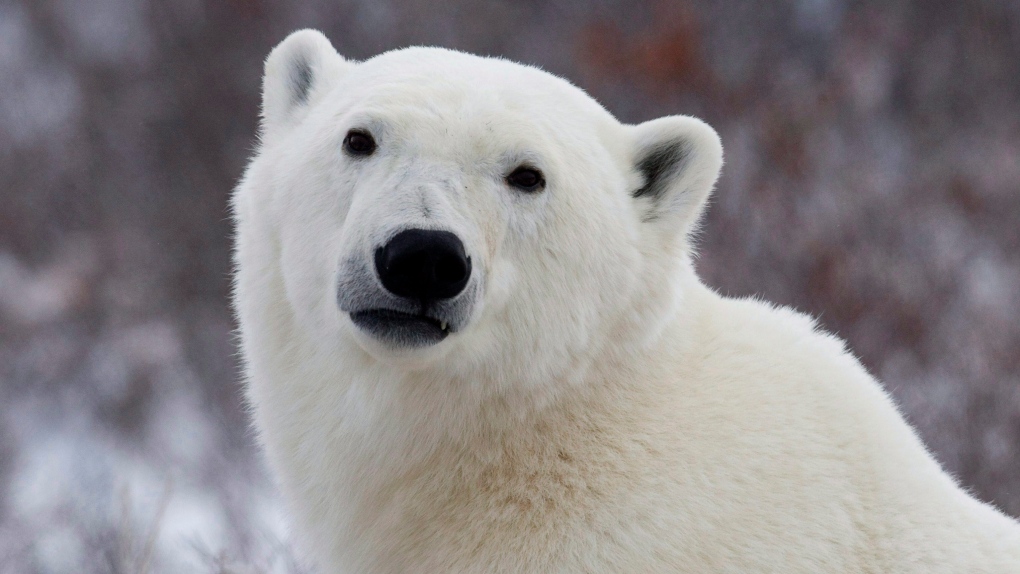Winnipeg zoo working to help protect polar bears from extinction
 A polar bear poses for the camera as he waits for the Hudson Bay to freeze over near Churchill, Man. Wednesday, Nov. 7, 2007. (Jonathan Hayward/ The Canadian Press)
A polar bear poses for the camera as he waits for the Hudson Bay to freeze over near Churchill, Man. Wednesday, Nov. 7, 2007. (Jonathan Hayward/ The Canadian Press)
With only an estimated 26,000 polar bears still living in the wild, several zoos around the world – including the Assiniboine Park Zoo in Winnipeg – are working together to find solutions to help protect the polar bear population in the wild.
The Polar Bear Research Council said Wednesday in a release that time is running out to save the species from extinction.
“Polar bears depend on sea ice to thrive and climate change is threatening this critical habitat,” the council said in a statement. “The window of opportunity to save the species from population declines and the threat of extinction is quickly shrinking. The need for collaborative, science-based research and conservation programs has never been greater.”
The Assiniboine Park Zoo, which contains a popular polar bear exhibit, is trying to help by conducting several different research projects that could help bears in the wild.
“Zoos that have polar bears have a really big role to play,” said Dr. Stephen Petersen, director of conservation and research with the zoo. “A lot of people think the bears are for the great weekend or day trip with the family, but behind the scenes, there are a lot of great care professionals taking care of the animals, we have veterinary teams, conservation scientists…that are looking at not only how do we provide the best care, but how do we work with bears in our care to help bears in the wild?"
Petersen said one project involves a hair growth study on some of the bears in captivity.
“Some of the bears have black dots of hair dye on them because we want to know, you know, how fast is that hair growing out,” he said. “And that tells researchers in the wild really important things.”
Petersen said researchers can then cut the hair and slice it into sections to see what it has been eating.
Petersen said the zoo is also working with Polar Bears International to develop a non-invasive tracking device.
The full master plan from Polar Bears International can be found here.
CTVNews.ca Top Stories

CDC says it's identified 1st documented cases of HIV transmitted through cosmetic needles
Three women diagnosed with HIV after getting 'vampire facial' procedures at an unlicensed medical spa are believed to be the first documented cases of people contracting the virus through a cosmetic procedure using needles.
All London Drugs stores closed across Western Canada due to system issue
All 79 locations of pharmacy and retail chain London Drugs are shut down Sunday, and there is no estimate on when they will be back open.
Deadly six-vehicle crash on Highway 400 sparked by road rage incident
One person was killed in a six-vehicle crash on Highway 400 in Innisfil Friday evening.
Ontario to ban use of cellphones in school classrooms starting in September
Ontario is introducing a suite of measures that will crack down on cellphone use and vaping in schools.
Australian prime minister describes domestic violence as a 'national crisis' after protests
Australia's Prime Minister Anthony Albanese on Monday described domestic violence as a 'national crisis' after thousands rallied around the country against violence toward women.
Casey DeSmith won’t start Game 4 for the Canucks
Rookie goalie Arturs Silovs will start in net for the Vancouver Canucks when they face the Nashville Predators in Game 4 of their first-round playoff series Sunday.
Putin likely didn't order death of Russian opposition leader Navalny, U.S. official says
U.S. intelligence officials have determined that Russian President Vladimir Putin likely didn't order the death of imprisoned opposition leader Alexei Navalny in February, according to an official familiar with the determination.
Tornadoes kill 4 in Oklahoma, leaving trail of destruction and thousands without power
Tornadoes killed four people in Oklahoma and left thousands without power Sunday after a destructive outbreak of severe weather flattened buildings in the heart of one rural town.
Murder charge laid after man falls to death from Toronto apartment balcony
One person has been charged with second-degree murder in connection with the death of a man who fell from a balcony following an altercation inside a Toronto apartment building.
































